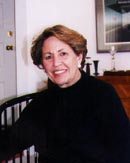


|
Alumni ProfileAdvice for the Young at HeartMarilyn Sokol, BA’77 (T-H), has been writing a weekly column, “Through the Years,” for the newspaper, The Record, since 1993 in which she regularly answers readers’ questions about concerns on aging. Now it’s FDU Magazine’s turn to ask some questions. Q. A nontraditional student during your time at FDU, what had you done prior to enrolling at the University? A. I raised three children and never stopped going to college. After high school, I earned a two-year degree in dental hygiene from the University of New York and worked in that field until my first child was born. As we moved around, I attended Brooklyn College and Temple University, and when I landed in New Jersey I went to FDU. I had just read in the newspaper that the University started a communications department, and I knew it would be something good for me. Q. What made you want to go into gerontology after getting a degree in journalism? A. When you’re young and married, you, your spouse and friends sit around dinner parties talking about children. When you’re older, you sit around these dinner parties and talk about your own parents’ problems ... and what I discovered was that I was the only person who never seemed to have these problems, because my parents had no problems, and that sparked my curiosity. I wondered what was so different about my parents or was it me who was so different? I did some reading and then took a two-year certification course in gerontology from Fordham University. Q. What is a typical day like for a columnist? A. I do one column a week, usually it takes a morning to write it. I always edit on another day so that I’m reviewing it with a fresh set of eyes. I’m not on tight deadlines, so I write ahead and have several columns prepared. |
|
|
Q. How much reader mail do you receive in a week? A. It fluctuates. Considering that my audience is the elderly, it’s really interesting that I get more e-mail than “snail” mail. The majority of it is commentary. I also receive a lot of constructive feedback. Q. What are some of the typical gerontology questions that you receive? A. Health and financial questions. But I also get a large number of intergenerational questions, like Dear Abby gets, skewed toward an older audience. Q. Tell us about some of the unusual questions asked? A. There was one couple who went to Atlantic City for the weekend. The wife saw her best friend’s husband, but not with her best friend. She asked me, “What should I do?” My advice was to forget it and not to get into the middle of the mess. I also suggested that her best friend probably knew that the husband was having an affair. I don’t respond to everything I receive. Sometimes, if I think there’s a serious problem, I’ll just pick up the phone and call the person; other times, I just read it and file it away in both the file folder and in my head. Q. Have you ever been stumped with a question? A. Not stumped in the sense that I could not answer it. If I get a question that is outside of my area of expertise even though it relates to aging, I’ll find someone to call about it. For legal questions, I have three lawyers who offer their services; and for medical questions, I will consult with a physician. On occasion, I’ll speak to specialists whom I don’t know, but to whom I’ve been referred by a friend. Once I had a letter inquiring about how to make a home suitable for someone who had a stroke and was in a wheelchair, and I was referred to someone who was in that exact business. Q. What is the most significant problem facing the elderly? A. Health insurance, absolutely. You think that you’re putting money away for a rainy day, then what happens when you’re older and there’s a major illness? It’s no longer a rainy day, it’s a storm. It could wipe out every penny you have. It’s terrible, that in our society, we’re not ensuring that people receive the care that they need. Q. What have you learned about the elderly that you didn’t already know? A. I couldn’t begin to tell you everything I’ve learned! The most important is that, when we are born, we are the most alike. As we age the more unique we become. Another fact that I discovered is that unless there is a significant intervention, whether it be a crisis or therapy, we don’t change very much. We modify as we get older and mature. If you had a great sense of humor when you were 17 years old, you’re going to have a great sense of humor at age 77. If you were optimistic at age 21, you’ll be the same at age 91. Your basic personality traits stay with you throughout your life. Notice how I emphasize the positive traits, the same happens with the negative traits: if you were a grouch in high school, you’ll be a grouch in the senior residence! —S.F.L. |
|
|
FDU Magazine Directory | Table of Contents | FDU Home Page | Alumni Home Page | Comments |
||